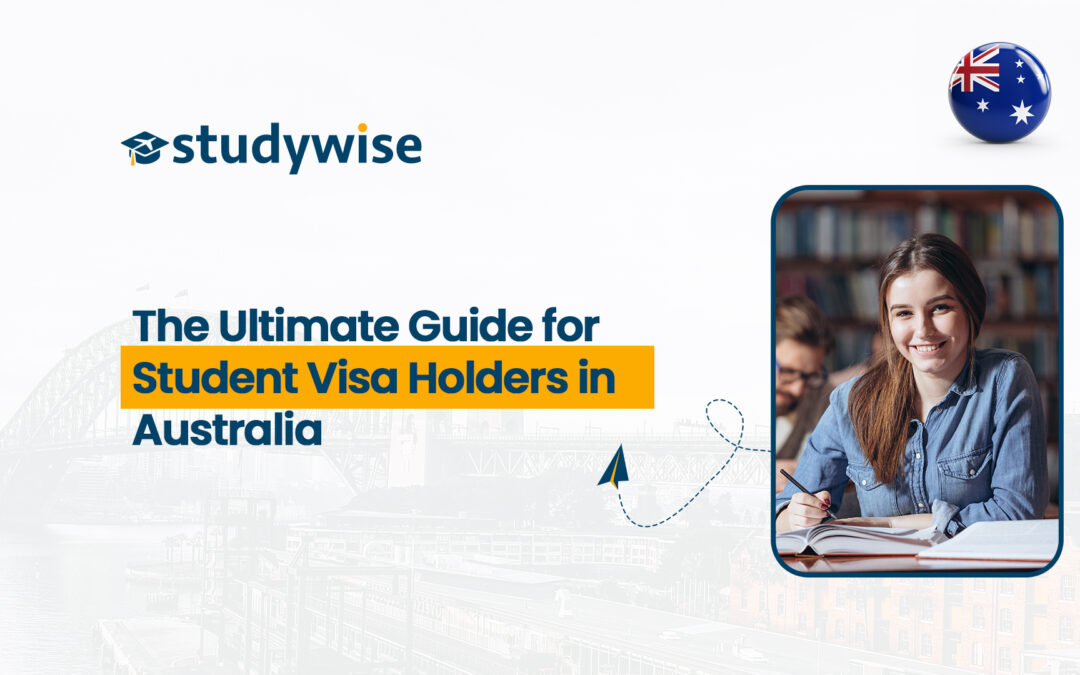Australia is undisputedly the top choice for students when they are considering studying abroad! According to a study, there are currently around 967,334 overseas students enrolled in educational institutions in this stunning country, all belonging to different parts of the world. With its renowned cities, exceptional academic institutions, and unmatched quality of life, it’s no surprise that Australia tops the list of most sought-after study-abroad destinations.
However, in order to pursue full-time studies in Australia, it is necessary to obtain a Student visa (subclass 500). Once you manage to acquire the visa, there is another set of guidelines for student visa holders in Australia, that you need to follow to avoid any complications during your stay in Australia.
We’ll guide you through the process of meeting these requirements, so you can focus on what truly matters – your studies and make the most of your time in Australia. So, without any delay, let’s get the ball rolling and learn everything you need to know!
Living Costs in Australia as a Student Visa Holder
Australia attracts a large sum of money from international students annually. Every year, students coming to Australia from different regions across the globe contribute over 29 billion to the Australian economy.
If you are a student, belonging to India, Pakistan or any other country planning to obtain your higher education in Australia, the cost of living will be the first thought that will cross your mind.
No doubt, in student life, expenses are a major concern. But with the strategic approach, we can manage everything. If you plan way ahead of time, the living expenses in Australia will be easy to bear for you. This country is full of work opportunities and allows students to support their studies here.
Firstly, let’s discuss the costs involved when you are coming to Australia on a student visa:
Initially, you have to pay anywhere around AU$ 710 as your visa fee. Keep in mind that this fee does not cover your tuition fee or living expenses.
Next, the amount you have to pay is for your compulsory Overseas Student Health Cover (OSHC). It will differ depending on the extent of coverage you opt for. If you decide to include dental and optical coverage, you will incur a greater expense. Therefore, try to set aside at least AU$ 580 as a single individual to cover your OSHC costs each year.
Other than that, once you have landed in this beautiful land, there’s another list of receipts that you are going to receive every month. These include your tuition fee, accommodation charges, food, bills, recreation, and more. On a rough estimate, expect to spend somewhere around 2,000 AUD every month and 24,000 AUD per year. If you have brought any of your family members with you then double these costs.
Hence, smartly plan your costs before traveling. If you are still puzzled with so many things floating around your mind, take out your cell phone and make a call to one of our proficient student counselors at StudyWise and get your queries resolved in the next moment.
Can You Plan for a Visa Extension and Further Studies in Australia?
As a student visa holder in Australia (subclass 500), you are authorized to pursue your studies in Australia for the entire duration of your course, which may last up to 5 years and correspond with your enrollment.
After the completion of your five-year term, you have two options: either apply for a new visa to continue your stay in Australia or contact the government to extend your current student visa if you plan to pursue additional studies. To begin the procedure, you can establish an ImmiAccount online to facilitate the processing of your visa application.
Starting your visa application process early is very important as it will give you sufficient time to collect all required documents. It is suggested that you start researching the courses you are interested in pursuing about four to five months in advance.
Job Opportunities for Student Visa Holders in Australia
Students with visas in Australia are limited to working a maximum of 48 hours every two weeks while studying. The minimum wage is around 20 Australian dollars per hour. No matter what job you do, this is a minimum set by the Fair Work Act.
Students can manage to earn around $855.20 per fortnight during their school time. However, during holidays, students are permitted to work for unlimited hours. Still, it is important to check your visa rules to confirm that you are authorized to work before you start your job hunt.
These limitations are set so that students can focus on obtaining quality education and skills in Australia, for which they have primarily come. Nevertheless, by following these work regulations, you can also get plenty of exposure, and work experience, and sustain yourself financially during your time in Australia.
The Australian Government has also permitted student visa holders who are currently employed in the aged care industry to work without restrictions. However, this exemption only pertains to employment within the aged care sector. While their studies are ongoing, any work outside of this sector is limited to 48 hours per fortnight.
Additionally, any work in the aged care sector must be conducted with an approved aged care provider in accordance with the Aged Care Quality and Safety Commission Act 2018, which was established in the year 2018.
Can You Bring Your Family Members on a Student Visa In Australia?
Studying abroad all alone can no doubt feel depressing sometimes.
If someone has family members by his side, they can offer love, care, and help to one another to get through those difficult times.
Therefore, Australia has taken this matter under consideration and allowed students to bring their family members to Australia during their school term.
Hence, the primary applicant for a student visa has the choice to include the members of his immediate family, i.e., spouse or children in the application. Upon approval of the visa, the entire family can relocate to Australia together.
If your family plans to accompany you during your university studies, you have the option to apply for a subsequent entrant visa. In some cases, families may opt for the primary applicant to migrate first and handle crucial tasks such as securing a residence, employment, and selecting schools for their children.
The principle of “one fails all fail” should also be taken into account when applying for visas. The applicants and their dependents must demonstrate good character and health. If any member of the family fails the character or medical assessments, all other family members will also be denied.
Further Rules and Regulations
Additional regulations and restrictions for student visa holders in Australia may also encompass the following:
- International students are obliged to be enrolled consistently in the same study program that has been authorized by the government of Australia.
- Students need to meet all of the requirements of the study program in which they are studying.
- Students must make sure to maintain satisfactory attendance in their course.
- Students also need to make progress for each study period as required by their institution.
- Students should also maintain Overseas Student Health Cover (OSHC).
Working during your study period in Australia is no doubt an excellent way for international students to up their finance game. However, it is essential to be aware of the restrictions as we discussed above to stay on the safe side
If you break any of these conditions, your student visa may be canceled. This means that you will have to depart from Australia, leaving everything behind and no one ever wants that.
Contact Us For Further Guidance
You can always contact StudyWise for a free counseling session, and we will guide you on how to go about the whole visa application procedure in your dream country. Plus we will also inform you regarding the set guidelines by the official authorities so that you don’t breach your visa conditions, and acquire the maximum benefit of your time in Australia as a student.
Download Our App
We have developed an incredible app for international students like you – StudyWise. On it, you can scroll, swipe and tap your way to the university of your dreams!
With its user-friendly interface, search hundreds of institutions and programmes in your chosen destination, and discover more about admission criteria, and requirements. You can also access information on study destinations, programme conditions and a lot more.
Download it now on your iPhone, iPad, Android, or laptop from the App Store or Play Store, create an account, fill out the form and start your search with one simple click.
So, take out your techno products, download and install StudyWise and get immediate access to everything you need.
FAQs:
Is it possible for me to remain in Australia following my graduation?
The student visa is often the initial step for numerous students towards relocating to Australia. After finishing your course, you can choose from several options to prolong your stay. If you satisfy the requirements, you may request a visa for postgraduate studies, skilled work, or employment.
Do I need to maintain a certain level of academic performance to validate my student visa?
The subclass 500 visa requirements do not outline specific academic performance standards. However, it is necessary to maintain satisfactory academic progress as directed by your educational institution to avoid any potential visa issues.
Once I have obtained a Student visa (subclass 500), can I change my course or educational institution?
It is possible to change your course or educational institution in Australia under certain conditions. However, it is essential to notify the Department of Home Affairs of any changes to your enrollment to comply with visa regulations.
Can I travel outside of Australia with a Student visa (subclass 500)?
If you possess a valid subclass 500 visa, you can travel outside of Australia and come back. However, it is crucial to verify that your visa remains valid during your planned travel and comply with any re-entry rules.



